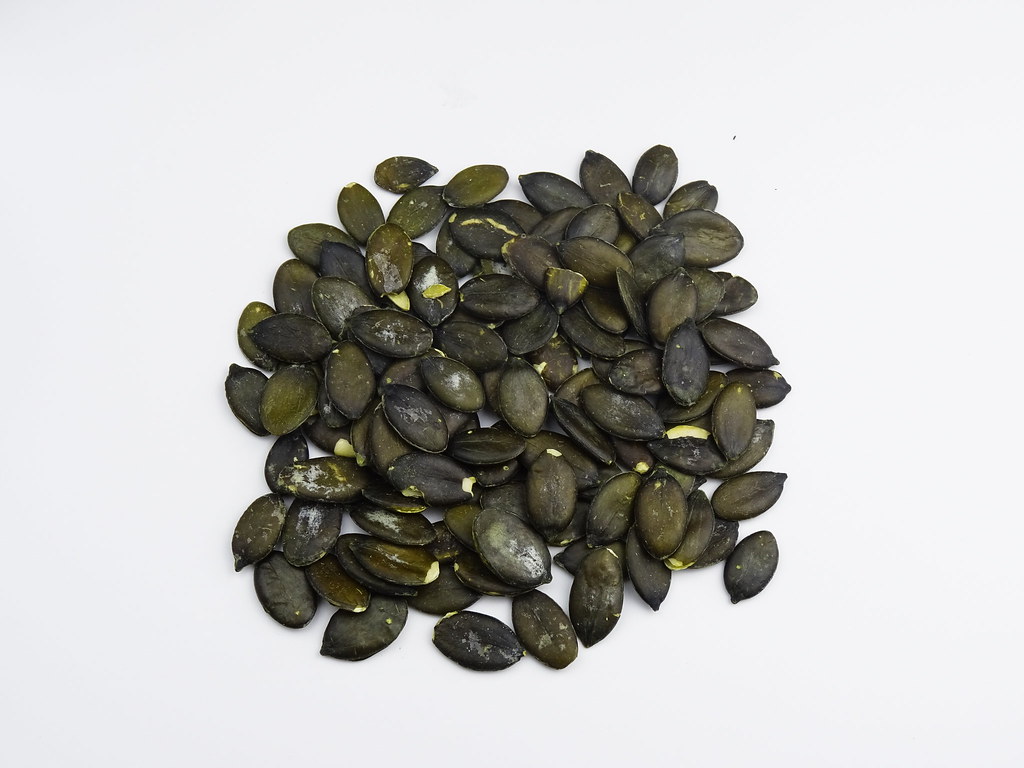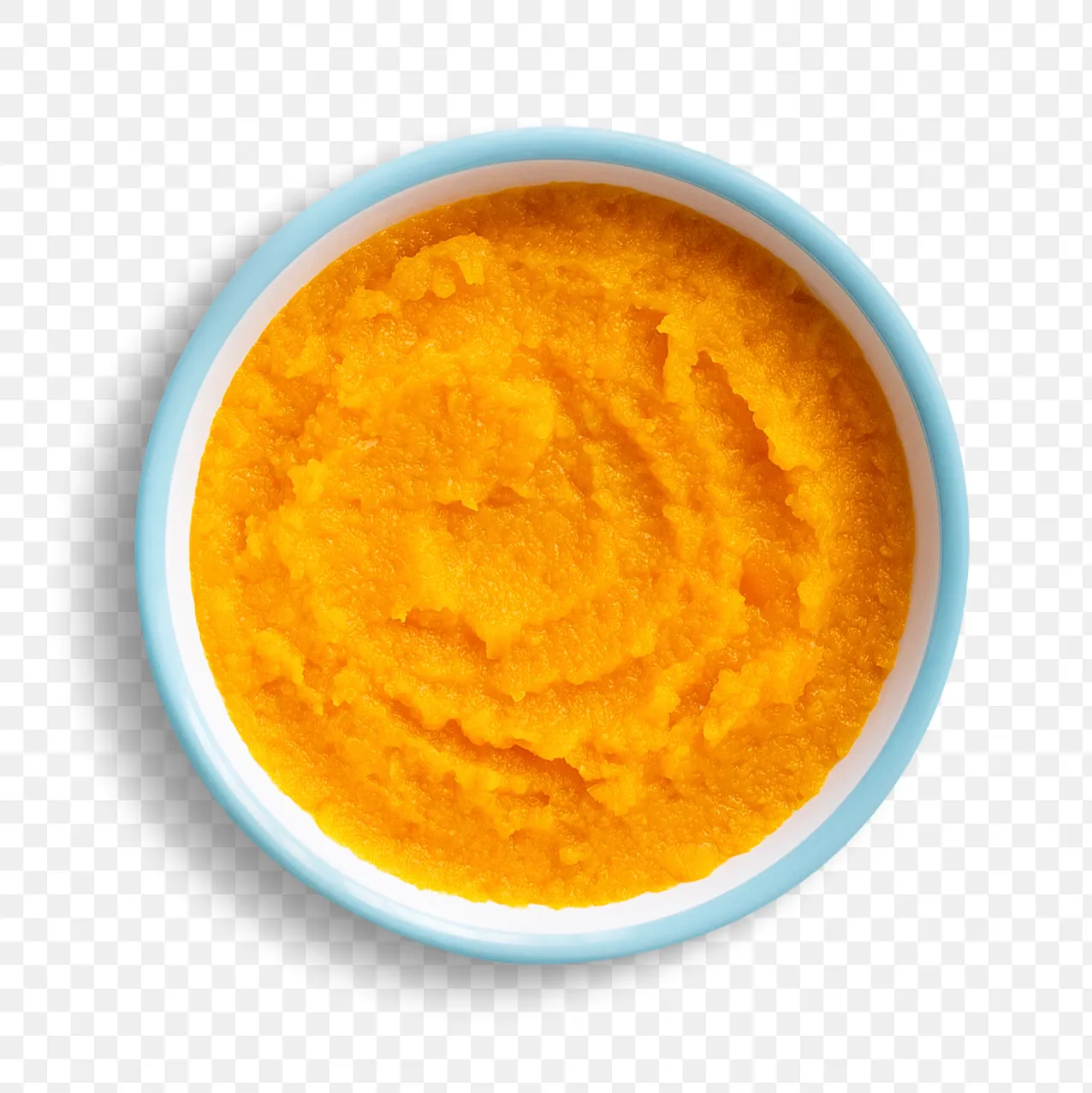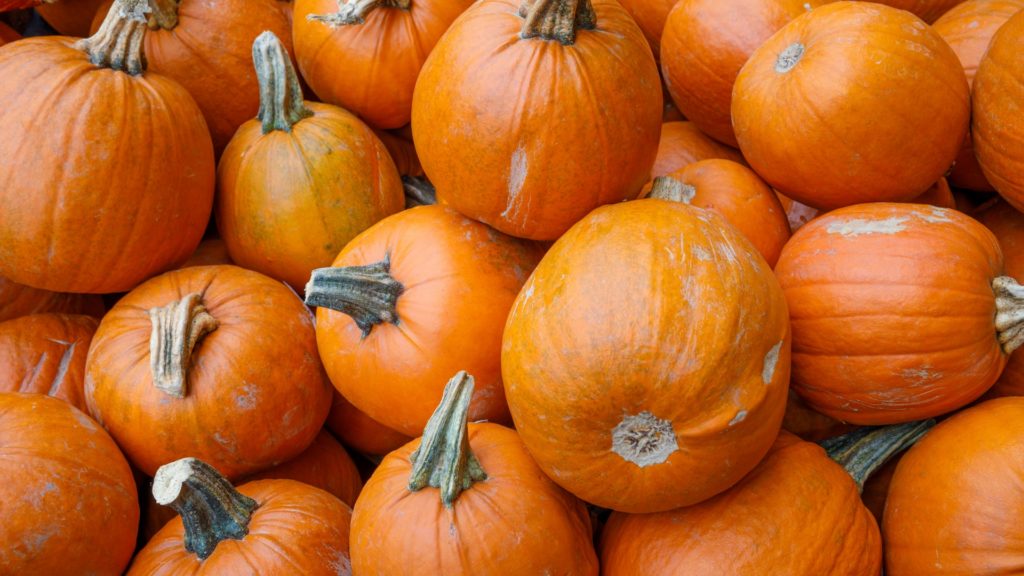Pumpkins are not just for carving on Halloween or for Thanksgiving. Your dog can benefit from eating pumpkin at any time of year. Here are two recipes and information about the health benefits of pumpkin. Each of the ingredients in the recipes below contain nutritional value. This is very healthy stuff!
Raw Pumpkin Spice Dog Treats
Here’s what you need:
- 3/4 cup canned pure pumpkin
- 1 tbsp raw honey
- 2 tsp cinnamon – see caution below
- 4 cups almond flour (add more if needed)
- 1/4 tsp salt
Mix all the ingredients together in a large bowl, adding more flour if necessary, until it forms a soft dough. Roll the dough into balls that are the right size for your dog, and then refrigerate.
That’s it! Store these treats in the fridge for one week or freeze for up to six months.
Caution:
- Don’t feed cinnamon to pregnant dogs. It can have a stimulating effect on the uterus.
- Don’t give your dog a cinnamon stick to chew on.
Great Pumpkin Soup
- 2 cups pumpkin, peeled and diced (or use canned if fresh isn’t available)
 1-1/2 cups of bone broth (making it more savory) or unsweetened apple juice
1-1/2 cups of bone broth (making it more savory) or unsweetened apple juice - 1 cup unsweetened carrot juice
- Juice 1 ripe avocado, peeled and pitted
- 1 tablespoon extra-virgin olive oil
- 1 clove garlic, peeled
- 1/4 cup raw pumpkin seeds
- 1 teaspoon ginger
- 1/2 teaspoon Ceylon cinnamon
Place all ingredients in a food processor or blender and puree thoroughly. Serve at room temperature or slightly warm for dogs (you may find that you enjoy it a bit warmer, especially during cold weather).
You can add a small amount over food or use a small amount on its own for tummy trouble.
What Are The Health Benefits of Pumpkin for Dogs?
Here are some properties of pumpkin that support your dog’s health.
1. Vitamins And Minerals
Pumpkin is packed with nutrients your dog needs. It’s a great source of Vitamins A, E, and C, which are important for the immune system, brain function, eyes, and skin health.
Pumpkin also contains important minerals like potassium, copper, manganese, and iron that each play a role in cellular functions.
2. Eye Health
Like other orange vegetables, pumpkin contains a lot of beta-carotene, which is a precursor for vitamin A. Once it converts to vitamin A in the body, it helps improve vision as well as boosting overall immunity and skin and coat health. The carotenoid zeaxanthin also protects your dog’s eyes from light damage.
3. Antioxidants
Antioxidants protect your dog from dangerous free radicals in the body. Free radicals are damaged cells that steal molecules from other cells. They’re a natural by-product of metabolism and exposure to toxins in the environment. If free radicals are uncontrolled, they can harm your dog’s cells and even his DNA.
Antioxidants in pumpkin include these plant pigments, called carotenoids:
- Beta-carotene
- Zeaxanthin
- Beta-cryptoxanthin
Carotenoids help lower cancer risk and degenerative disease. Studies show that they may also be good for bone health. Like beta carotene, beta-cryptoxanthin also forms vitamin A. Zeaxanthin contributes to slowing down the aging process, improving heart health, increasing glutathione levels, and reducing inflammation of the skin.
4. Anti-Parasitic
Pumpkin seeds are a natural and effective way to remove parasites like worms from your dog’s digestive tract. The seeds contain the amino acid cucurbitin, which paralyzes worms. Studies in both rats and puppies have shown the ability of pumpkin seeds to get rid of intestinal worms.
5. Fiber
Pumpkin is a good source of fiber, which is great for your dog’s digestive health. The soluble fiber content in pumpkin absorbs water, which can help to solidify runny stool when your dog has diarrhea.
The fiber can also help with the opposite problem, by loosening up the packed stool in the case of constipation.
The fiber in pumpkin can also help your dog feel full for longer. And fiber can also help prevent anal gland problems in dogs.
Interesting Ways to Feed Pumpkin to your Dog
The valuable parts of the pumpkin are the seeds and the flesh. As with any vegetable, organic pumpkin is the healthiest choice for your dog, to avoid produce grown with pesticides.
Pumpkin Seeds
 Pumpkin seeds are low in fat and rich in protein. When using seeds as a remedy for intestinal worms, make sure that you only give your dog raw organic seeds, not the salted, roasted pumpkin seeds that humans eat. I recommend pumkin seeds that are already hulled.
Pumpkin seeds are low in fat and rich in protein. When using seeds as a remedy for intestinal worms, make sure that you only give your dog raw organic seeds, not the salted, roasted pumpkin seeds that humans eat. I recommend pumkin seeds that are already hulled.
The best way to give your dog the benefit of pumpkin seeds is to grind them and add a ½ teaspoon per 20lbs of weight to her food once or twice per day. Continue this once or twice per day until you no longer see worms or eggs in her stool.
Pumpkin Flesh
 You can give your dog fresh puréed pumpkin or canned pumpkin purée as part of her regular meal.
You can give your dog fresh puréed pumpkin or canned pumpkin purée as part of her regular meal.
As part of a regular healthy diet, you can give your dog anywhere from 1/3 to ½ cup of pumpkin each day. You can give it raw or cooked, whichever your dog prefers. If you feed it raw, you’ll need to mulch or puree it for digestibility. Cooked pumpkin can be fed cubed if your dog likes something a bit more chewy.
It might surprise you to know that it may be better to give your dog canned pureed pumpkin rather than fresh. This is because canned pumpkin is more concentrated with fiber and nutrients and less water content. Plus, canned pumpkin is available year-round and is more convenient to store. But do make sure that you buy plain pumpkin, and not pumpkin pie filling with added spices, salt, or sugar. You can even buy canned pumpkin that’s sold for dogs … but it’s usually more expensive than regular grocery store canned pumpkin and doesn’t have any unique ingredients.
How Pumpkin Helps Dogs With Diarrhea Or Constipation
Pumpkin can often be an easy fix for mild diarrhea or constipation in dogs. The secret is in the fiber content, which can help with both conditions.
If your dog has diarrhea, add 1 to 4 tablespoons of canned pumpkin to her food for a few days until her stools become firmer. The fiber absorbs and helps remove excess water from her digestive tract.
For constipation, add 1 to 4 tablespoons of food to her meal. Make sure she gets plenty of water because dehydration can be a reason for constipation. Fiber absorbs the extra water and helps ease bowel movements.
With either diarrhea or constipation, if your dog isn’t better in a couple of days, you’ll need to find out what’s causing the problem so you can consider other solutions.
Sources:
|
AHI, Kymythy Schultze CN. “The Great Pumpkin: Seasonal Soup Recipe For Your Dog.” Dogs Naturally, Dogs Naturally Magazine, 9 Nov. 2021, https://www.dogsnaturallymagazine.com/pumpkin-soup-for-dogs/. Grewal, Gogi. “Health Benefits Of Pumpkin For Dogs.” Dogs Naturally, Dogs Naturally Magazine, 6 Nov. 2021, https://www.dogsnaturallymagazine.com/health-benefits-of-pumpkin-for-dogs/. Smith, Caitlyn. “5 Benefits Of Cinnamon and Pumpkin For Dogs.” Dogs Naturally, Dogs Naturally Magazine, 6 Nov. 2021, https://www.dogsnaturallymagazine.com/5-benefits-of-cinnamon-and-pumpkin-for-dogs/. |








